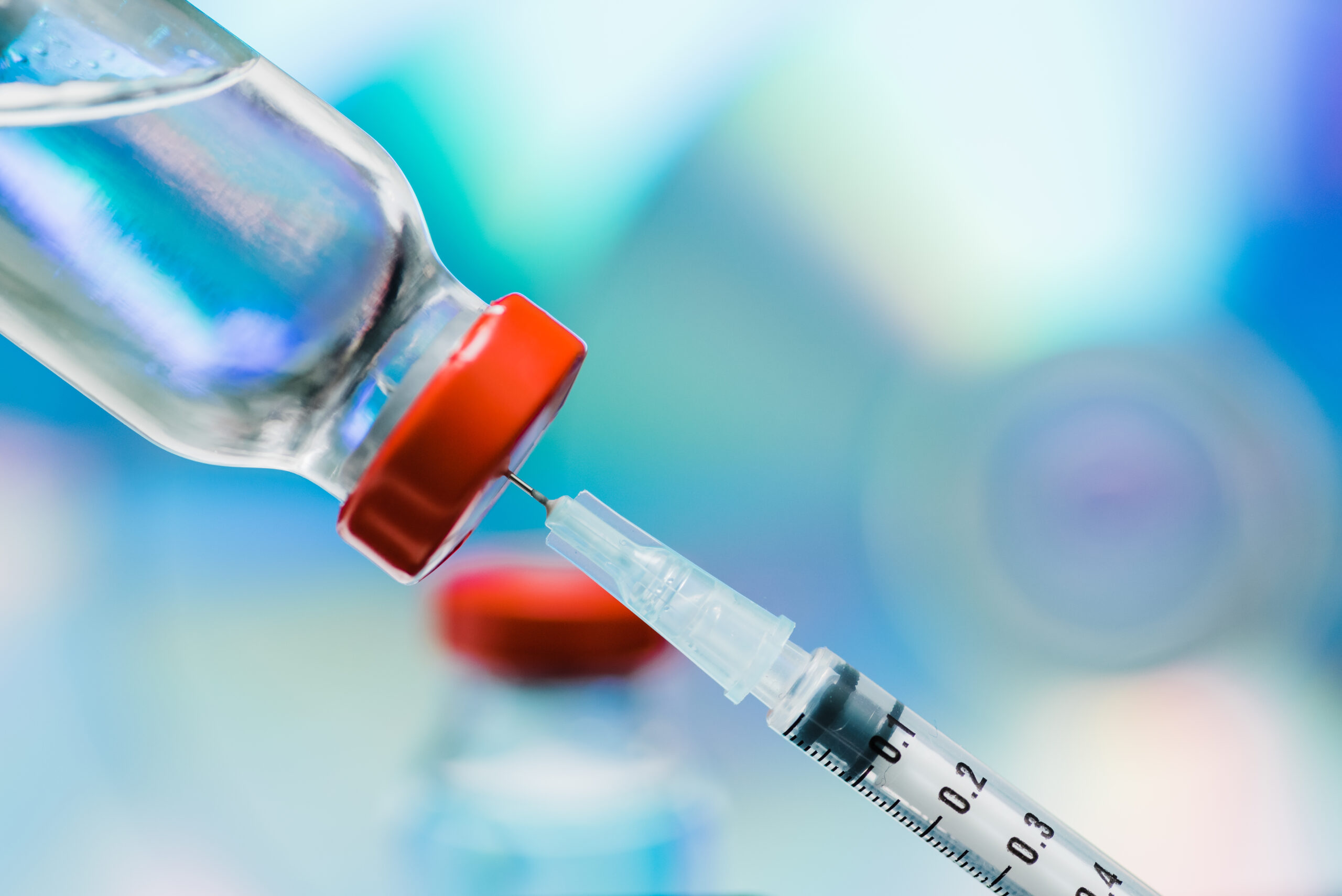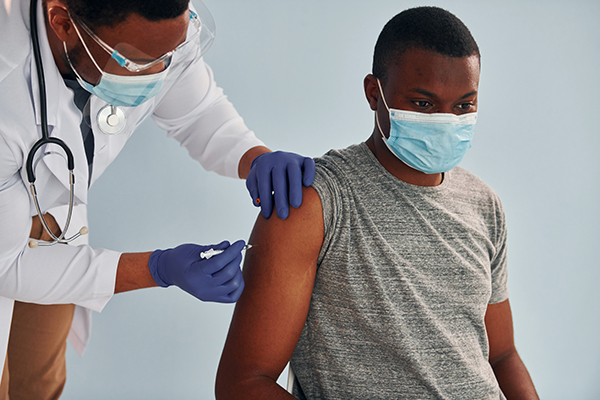COVID Myths Toolkit: Debunking Misinformation
What is the purpose of this toolkit?
While millions of people have gotten vaccinated against COVID-19, it has become clear that special considerations and targeted messages shared by trusted voices are still needed to encourage some groups to get vaccinated and fight vaccine misinformation.
Who is this toolkit for?
This toolkit is designed to help those with trusted voices – including radio hosts, faith leaders, and others – to share accurate information about COVID-19 vaccines and COVID-19 to fight misinformation and vaccine hesitancy.
How do I use this page?
The information here is organized to help you COVID-19 misinformation pertaining to specific types of questions on COVID-19 vaccines or the vaccine development process. Additional resources will be added on an ongoing basis.
Click on these sections to access the resources: Myths on Personal Health | Myths on Science and Vaccine Development Process | Myths on Vaccinations and Children | Myths on Booster Shots | Trusted Resources
Myths on Personal Health
These resources focus on misconceptions and information on how COVID-19 vaccines impact personal health.
 MYTH: COVID-19 vaccine cause infertility in women.
MYTH: COVID-19 vaccine cause infertility in women.
 FACT: The COVID-19 vaccine will not affect fertility. The truth is that “the COVID-19 vaccine encourages the body to create copies of the spike protein found on the coronavirus’s surface (Maragakis & Kelen, 2021).” This teaches the body’s immune system to fight the virus that has that specific spike protein on it. For pregnant people, the vaccination shows no harm to the person or to the baby. However, risk of severe illness can arise from catching the Covid-19 virus. For people who want to have a baby, no evidence has shown any effect on fertility from the COVID-19 vaccine.
FACT: The COVID-19 vaccine will not affect fertility. The truth is that “the COVID-19 vaccine encourages the body to create copies of the spike protein found on the coronavirus’s surface (Maragakis & Kelen, 2021).” This teaches the body’s immune system to fight the virus that has that specific spike protein on it. For pregnant people, the vaccination shows no harm to the person or to the baby. However, risk of severe illness can arise from catching the Covid-19 virus. For people who want to have a baby, no evidence has shown any effect on fertility from the COVID-19 vaccine.
 MYTH: COVID-19 vaccine causes infertility in men.
MYTH: COVID-19 vaccine causes infertility in men.
 FACT: COVID-19 vaccines have no effect on male infertility. There is no scientific data to suggest that the authorized COVID-19 vaccines cause infertility, according to the Food and Drug Administration (FDA). Infertility is also not known to result from the COVID-19 disease itself. However studies have shown that testicular production and sperm count can be affected by the COVID virus. Catching the COVID-19 virus can cause decreased sperm count, testicular inflammation and pain, as well as sperm duct inflammation. To protect yourself against COVID-19, vaccination is the best option.
FACT: COVID-19 vaccines have no effect on male infertility. There is no scientific data to suggest that the authorized COVID-19 vaccines cause infertility, according to the Food and Drug Administration (FDA). Infertility is also not known to result from the COVID-19 disease itself. However studies have shown that testicular production and sperm count can be affected by the COVID virus. Catching the COVID-19 virus can cause decreased sperm count, testicular inflammation and pain, as well as sperm duct inflammation. To protect yourself against COVID-19, vaccination is the best option.
 MYTH: The COVID-19 vaccine can give me COVID-19.
MYTH: The COVID-19 vaccine can give me COVID-19.
 FACT: The vaccine for COVID-19 cannot and will not give you COVID-19. The authorized mRNA vaccines instruct your cells to reproduce a protein that is part of the SARS-CoV-2 coronavirus, which helps your body recognize and fight the virus, if it comes along. The COVID-19 vaccine does not contain the SARS-CoV-2 virus, so you cannot get COVID-19 from the vaccine. The protein that helps your immune system recognize and fight the virus does not cause infection of any sort. Other types of commonly used vaccines include, inactivated and live-attenuated. Inactivated vaccines use a killed version of the virus to create short term protection. We usually see these in flu and rabies vaccines. Live-attenuated vaccines use a live, weakened version of the virus to create immunity. We typically see these used in vaccines like the chicken pox and the measles.
FACT: The vaccine for COVID-19 cannot and will not give you COVID-19. The authorized mRNA vaccines instruct your cells to reproduce a protein that is part of the SARS-CoV-2 coronavirus, which helps your body recognize and fight the virus, if it comes along. The COVID-19 vaccine does not contain the SARS-CoV-2 virus, so you cannot get COVID-19 from the vaccine. The protein that helps your immune system recognize and fight the virus does not cause infection of any sort. Other types of commonly used vaccines include, inactivated and live-attenuated. Inactivated vaccines use a killed version of the virus to create short term protection. We usually see these in flu and rabies vaccines. Live-attenuated vaccines use a live, weakened version of the virus to create immunity. We typically see these used in vaccines like the chicken pox and the measles.
 MYTH: The side effects of the COVID-19 vaccine are dangerous.
MYTH: The side effects of the COVID-19 vaccine are dangerous.
 FACT: The Pfizer and Moderna COVID-19 vaccines , as well as the Johnson & Johnson vaccine, can have side effects, but the vast majority are very short term —not serious or dangerous. The vaccine developers report that some people experience pain where they were injected; body aches; headaches or fever, lasting for a day or two. These are signs that the vaccine is working to stimulate your immune system. The side effects are not as serious as the actual COVID virus infection with symptoms such as shortness of breath, fatigue, high temperature and death.
FACT: The Pfizer and Moderna COVID-19 vaccines , as well as the Johnson & Johnson vaccine, can have side effects, but the vast majority are very short term —not serious or dangerous. The vaccine developers report that some people experience pain where they were injected; body aches; headaches or fever, lasting for a day or two. These are signs that the vaccine is working to stimulate your immune system. The side effects are not as serious as the actual COVID virus infection with symptoms such as shortness of breath, fatigue, high temperature and death.
 MYTH: The COVID-19 vaccine causes long-term complications.
MYTH: The COVID-19 vaccine causes long-term complications.
 FACT: The adverse effects associated with most vaccines become evident within 2 to 3 months of the administration of the vaccine. We’re beyond that now with the COVID vaccines, and have given millions of doses of it, so we know what the side effects profile is. The U.S. government VAERS system (Vaccine Adverse Event Reporting System), as well as vaccine manufacturers, are continuing to identify and investigate any long-term events related to vaccine side effects. They have a system in place to follow up with recommendations whenever an unexpected events occur.
FACT: The adverse effects associated with most vaccines become evident within 2 to 3 months of the administration of the vaccine. We’re beyond that now with the COVID vaccines, and have given millions of doses of it, so we know what the side effects profile is. The U.S. government VAERS system (Vaccine Adverse Event Reporting System), as well as vaccine manufacturers, are continuing to identify and investigate any long-term events related to vaccine side effects. They have a system in place to follow up with recommendations whenever an unexpected events occur.
 MYTH: If I’ve already had COVID-19, I don’t need a vaccine.
MYTH: If I’ve already had COVID-19, I don’t need a vaccine.
 FACT: People who have gotten sick with COVID-19 still benefit from getting vaccinated. Due to the severe health risks associated with COVID-19 and the fact that re-infection with COVID-19 is possible, people may be advised to get a COVID-19 vaccine even if they have been sick with COVID-19 before.
FACT: People who have gotten sick with COVID-19 still benefit from getting vaccinated. Due to the severe health risks associated with COVID-19 and the fact that re-infection with COVID-19 is possible, people may be advised to get a COVID-19 vaccine even if they have been sick with COVID-19 before.
 MYTH: The COVID-19 vaccines cause COVID-19 variants.
MYTH: The COVID-19 vaccines cause COVID-19 variants.
 FACT: The COVID-19 virus itself, not the vaccines, produces the variants. The virus in a human being multiplies and creates new viruses that generate genetic variation. When this happens, most variations are harmless with no effect. But on rare occasion, you can get one mutation or a series of them coincidentally occurring that will create a variant that will continue to reproduce, such as the highly contagious COVID variant, Delta, or the newly identified Omicron.
FACT: The COVID-19 virus itself, not the vaccines, produces the variants. The virus in a human being multiplies and creates new viruses that generate genetic variation. When this happens, most variations are harmless with no effect. But on rare occasion, you can get one mutation or a series of them coincidentally occurring that will create a variant that will continue to reproduce, such as the highly contagious COVID variant, Delta, or the newly identified Omicron.
 MYTH: Getting the COVID-19 vaccine means I can stop wearing my mask and taking coronavirus precautions.
MYTH: Getting the COVID-19 vaccine means I can stop wearing my mask and taking coronavirus precautions.
 FACT: The CDC has revised safety guidelines for those who are fully vaccinated against the coronavirus. The updated guidelines state that fully vaccinated people can resume activities with wearing a mask or physically distancing in areas high populated and/or with high rates of transmission. Remember to still check and follow federal, state, local, tribal, or territorial laws, rules, and regulations, including local business and workplace guidance.
FACT: The CDC has revised safety guidelines for those who are fully vaccinated against the coronavirus. The updated guidelines state that fully vaccinated people can resume activities with wearing a mask or physically distancing in areas high populated and/or with high rates of transmission. Remember to still check and follow federal, state, local, tribal, or territorial laws, rules, and regulations, including local business and workplace guidance.
 MYTH: I can’t get the flu vaccine and the COVID-19 vaccine at the same time
MYTH: I can’t get the flu vaccine and the COVID-19 vaccine at the same time
 FACT: You can receive the flu vaccine, as well as other vaccines, and the COVID-19 vaccine in the same visit. Studies have shown that immune response and side effects are generally the same as they would be if the vaccines were given alone.
FACT: You can receive the flu vaccine, as well as other vaccines, and the COVID-19 vaccine in the same visit. Studies have shown that immune response and side effects are generally the same as they would be if the vaccines were given alone.
 MYTH: The Omicron variant is no worse than the common cold.
MYTH: The Omicron variant is no worse than the common cold.
 FACT: The common cold typically causes mild, self-limited symptoms whereas Omicron, like other COVID variants, can result in serious or fatal illness. While the Omicron variant generally has less severe symptoms than other variants, it can still be deadly, especially to those who are not vaccinated or have weakened immune systems. Some COVID-19 variants can cause different reactions, but just because Omicron causes less severe symptoms than variants like Delta does not mean it is not dangerous. COVID-19 and the common cold have a lot of similar symptoms, but COVID-19 is more likely to cause body aches, fever, and a new loss of smell of taste. Omicron is not like a common cold because it is more likely than a cold to land you in hospital. It is also expected that people who have been infected from Omicron and recover are also at risk of developing long COVID conditions.
FACT: The common cold typically causes mild, self-limited symptoms whereas Omicron, like other COVID variants, can result in serious or fatal illness. While the Omicron variant generally has less severe symptoms than other variants, it can still be deadly, especially to those who are not vaccinated or have weakened immune systems. Some COVID-19 variants can cause different reactions, but just because Omicron causes less severe symptoms than variants like Delta does not mean it is not dangerous. COVID-19 and the common cold have a lot of similar symptoms, but COVID-19 is more likely to cause body aches, fever, and a new loss of smell of taste. Omicron is not like a common cold because it is more likely than a cold to land you in hospital. It is also expected that people who have been infected from Omicron and recover are also at risk of developing long COVID conditions.
 MYTH: If I already had COVID, I now have natural immunity to the coronavirus and am totally protected.
MYTH: If I already had COVID, I now have natural immunity to the coronavirus and am totally protected.
 FACT: Natural immunity to COVID-19 weakens faster than immunity provided by vaccinations. Immunity is your body’s ability to protect you from getting sick when you are exposed to an infectious agent. Vaccine-induced immunity is what we get by being fully vaccinated with an approved or authorized COVID-19 vaccine. Studies suggest that natural immunity may increase the protection of the shots when there is a longer time period between having COVID-19 and getting vaccinated.
FACT: Natural immunity to COVID-19 weakens faster than immunity provided by vaccinations. Immunity is your body’s ability to protect you from getting sick when you are exposed to an infectious agent. Vaccine-induced immunity is what we get by being fully vaccinated with an approved or authorized COVID-19 vaccine. Studies suggest that natural immunity may increase the protection of the shots when there is a longer time period between having COVID-19 and getting vaccinated.
 MYTH: You can only get COVID-19 once.
MYTH: You can only get COVID-19 once.
 FACT: A person previously infected or recovering from COVID-19 can become infected again. While some people have increased immunity after initial infection, this does wane. The best way to protect against infection and reinfection is to get full vaccinated against COVID-19.
FACT: A person previously infected or recovering from COVID-19 can become infected again. While some people have increased immunity after initial infection, this does wane. The best way to protect against infection and reinfection is to get full vaccinated against COVID-19.
Myths on Science and Vaccine Development Process
These myths focus on safety and effectiveness COVID-19 vaccines including addressing common misconceptions surrounding how the vaccines were researched and developed.
 MYTH: Researchers rushed the development of the COVID-19 vaccine, and its safety and effectiveness can’t be trusted.
MYTH: Researchers rushed the development of the COVID-19 vaccine, and its safety and effectiveness can’t be trusted.
 FACT: Scientists have been working with developing and researching ways to prevent or slow the spread of coronaviruses for years. With the knowledge of these viruses already underway, and the information of the COVID-19 virus being shared globally the vaccine development for COVID-19 was able to be processed quicker. After the initial development the vaccines till had to undergo three separate clinical trials to ensure safety and effectiveness. None of these are ever skipped. Studies found that the two initial vaccines are both about 95% effective — and reported no serious or life-threatening side effects. As well, many companies and governments were able to give the proper resources for creation, so funding was not an issue.
FACT: Scientists have been working with developing and researching ways to prevent or slow the spread of coronaviruses for years. With the knowledge of these viruses already underway, and the information of the COVID-19 virus being shared globally the vaccine development for COVID-19 was able to be processed quicker. After the initial development the vaccines till had to undergo three separate clinical trials to ensure safety and effectiveness. None of these are ever skipped. Studies found that the two initial vaccines are both about 95% effective — and reported no serious or life-threatening side effects. As well, many companies and governments were able to give the proper resources for creation, so funding was not an issue.
 MYTH: The messenger RNA technology that is used to make the COVID-19 vaccine is brand new.
MYTH: The messenger RNA technology that is used to make the COVID-19 vaccine is brand new.
 FACT: The mRNA technology behind the new coronavirus vaccines has been in development for almost two decades. Vaccine makers created the technology to help them respond quickly to a new pandemic illness, such as COVID-19. Messenger RNA creates proteins in your body that mimic a protein like the SARS-CoV-2 virus, allowing your body to adjust and help fight it off.
FACT: The mRNA technology behind the new coronavirus vaccines has been in development for almost two decades. Vaccine makers created the technology to help them respond quickly to a new pandemic illness, such as COVID-19. Messenger RNA creates proteins in your body that mimic a protein like the SARS-CoV-2 virus, allowing your body to adjust and help fight it off.
 MYTH: The COVID-19 vaccine enters your cells and changes your DNA.
MYTH: The COVID-19 vaccine enters your cells and changes your DNA.
 FACT: The COVID-19 vaccines are designed to help your body’s immune system fight the coronavirus. The messenger RNA in the vaccine does enter cells, but not the nucleus of the cells where DNA resides. The mRNA does its job to cause the cell to make protein to stimulate the immune system, and then it quickly breaks down, without affecting your DNA at all.
FACT: The COVID-19 vaccines are designed to help your body’s immune system fight the coronavirus. The messenger RNA in the vaccine does enter cells, but not the nucleus of the cells where DNA resides. The mRNA does its job to cause the cell to make protein to stimulate the immune system, and then it quickly breaks down, without affecting your DNA at all.
 MYTH: COVID-19 vaccines were developed to deliver a microchip into my body.
MYTH: COVID-19 vaccines were developed to deliver a microchip into my body.
 FACT: There is not a microchip in the vaccines. This rumor started after comments were made about digital vaccine records. States maintain electronic immunization records to help people and their physicians know which vaccines they have received. There are no electronic components in any of the vaccines. The mRNA vaccines contain only mRNA, lipids (fat bubble), salts and other stabilizing agents, which are routinely used in other medicines. The other vaccines contain the non-replicating adenovirus vector and stabilizing agents.
FACT: There is not a microchip in the vaccines. This rumor started after comments were made about digital vaccine records. States maintain electronic immunization records to help people and their physicians know which vaccines they have received. There are no electronic components in any of the vaccines. The mRNA vaccines contain only mRNA, lipids (fat bubble), salts and other stabilizing agents, which are routinely used in other medicines. The other vaccines contain the non-replicating adenovirus vector and stabilizing agents.
 MYTH: The COVID-19 vaccine was developed with controversial substances.
MYTH: The COVID-19 vaccine was developed with controversial substances.
 FACT: The COVID-19 vaccines authorized by the FDA contain mRNA and other, normal vaccine ingredients, such as fats (which protect the mRNA), salts, as well as a small amount of sugar. These COVID-19 vaccines were not developed using fetal tissue, and they do not contain any material, such as implants, microchips or tracking devices.
FACT: The COVID-19 vaccines authorized by the FDA contain mRNA and other, normal vaccine ingredients, such as fats (which protect the mRNA), salts, as well as a small amount of sugar. These COVID-19 vaccines were not developed using fetal tissue, and they do not contain any material, such as implants, microchips or tracking devices.
 MYTH: Vaccines can cause autism.
MYTH: Vaccines can cause autism.
 FACT: Vaccines do not cause autism. This incorrect claim stems from a study that has been discredited. Unfortunately, this flawed study has created much misinformation. There have been some concerns that Autism spectrum disorder might be linked to the vaccines children receive, but studies have shown that there is no link between receiving vaccines and developing Autism spectrum disorder. The National Academy of Medicine has reviewed many vaccines and have found them all to be safe, and not a cause for autism. No ingredients in vaccines can cause autism either. All ingredients have been separated and studied. No significant evidence was found to support this claim.
FACT: Vaccines do not cause autism. This incorrect claim stems from a study that has been discredited. Unfortunately, this flawed study has created much misinformation. There have been some concerns that Autism spectrum disorder might be linked to the vaccines children receive, but studies have shown that there is no link between receiving vaccines and developing Autism spectrum disorder. The National Academy of Medicine has reviewed many vaccines and have found them all to be safe, and not a cause for autism. No ingredients in vaccines can cause autism either. All ingredients have been separated and studied. No significant evidence was found to support this claim.
Myths on Vaccinations and Children
These myths focus on the misconceptions surrounding COVID-19 vaccines in children and adolescents.
 MYTH: COVID-19 vaccines are dangerous for children.
MYTH: COVID-19 vaccines are dangerous for children.
 FACT: The Pfizer vaccine has been confirmed by the FDA and CDC to be safe and effective and is authorized for people 5 and older. The FDA has given this vaccine emergency authorization for ages 5-15 and full approval for ages 16 and up. Reported side effects were like those that older teens and adults experienced such as pain at the injection site, fatigue and body aches, and clinical trial data showed the vaccine to be safe and effective for this age group. The other COVID-19 vaccines that have been authorized for adults in the United States are being studied closely using clinical trials to confirm they are also safe and effective for children.
FACT: The Pfizer vaccine has been confirmed by the FDA and CDC to be safe and effective and is authorized for people 5 and older. The FDA has given this vaccine emergency authorization for ages 5-15 and full approval for ages 16 and up. Reported side effects were like those that older teens and adults experienced such as pain at the injection site, fatigue and body aches, and clinical trial data showed the vaccine to be safe and effective for this age group. The other COVID-19 vaccines that have been authorized for adults in the United States are being studied closely using clinical trials to confirm they are also safe and effective for children.
 MYTH: COVID-19 vaccines aren’t necessary for children.
MYTH: COVID-19 vaccines aren’t necessary for children.
 FACT: COVID vaccines protect children from severe illness and help control the spread of COVID-19. Recent data shows children represent about 14% of all COVID-19 cases in the U.S., and that number continues to rise. While it appears that severe illness due to COVID-19 is less common among children, experts are still unsure of the long-term impacts on their physical and mental health.
FACT: COVID vaccines protect children from severe illness and help control the spread of COVID-19. Recent data shows children represent about 14% of all COVID-19 cases in the U.S., and that number continues to rise. While it appears that severe illness due to COVID-19 is less common among children, experts are still unsure of the long-term impacts on their physical and mental health.
 MYTH: My child cannot get a COVID-19 vaccine before or after getting another vaccine.
MYTH: My child cannot get a COVID-19 vaccine before or after getting another vaccine.
 FACT: Your child can get a COVID-19 vaccine and other vaccines on the same visit. You no longer need to wait 14 days between vaccinations. New data has shown that the way our bodies develop protection after getting vaccinated and possible side effects of vaccines are generally the same when given alone or with other vaccines.
FACT: Your child can get a COVID-19 vaccine and other vaccines on the same visit. You no longer need to wait 14 days between vaccinations. New data has shown that the way our bodies develop protection after getting vaccinated and possible side effects of vaccines are generally the same when given alone or with other vaccines.
 MYTH: If my child already had COVID-19, they do not need to get the vaccine.
MYTH: If my child already had COVID-19, they do not need to get the vaccine.
 FACT: Everyone who is eligible should be vaccinated, regardless of age or whether they already had COVID-19. That’s because experts do not yet know how long someone is protected from getting sick again after recovering from COVID-19. It’s also possible – although rare – that someone could be infected with COVID-19 again, even after recovering.
FACT: Everyone who is eligible should be vaccinated, regardless of age or whether they already had COVID-19. That’s because experts do not yet know how long someone is protected from getting sick again after recovering from COVID-19. It’s also possible – although rare – that someone could be infected with COVID-19 again, even after recovering.
 MYTH: The COVID-19 vaccine did not get FDA approved for children under the age of 16.
MYTH: The COVID-19 vaccine did not get FDA approved for children under the age of 16.
 FACT: The FDA has given the Pfizer vaccine emergency authorization for ages 5-15 and full approval for ages 16 and up. The benefits of being vaccinated against COVID-19 outweigh the risk, get a vaccine for anyone ages 5 and olde, Emergency use authorization is a mechanism used to push medical products in emergency situations. These authorizations show that the products have met a certain level of FDA criteria and proves to be the only or main defense against certain emergency situations. Full approval means the medical products has finished all phases of clinical trials and has been approved by the FDA.
FACT: The FDA has given the Pfizer vaccine emergency authorization for ages 5-15 and full approval for ages 16 and up. The benefits of being vaccinated against COVID-19 outweigh the risk, get a vaccine for anyone ages 5 and olde, Emergency use authorization is a mechanism used to push medical products in emergency situations. These authorizations show that the products have met a certain level of FDA criteria and proves to be the only or main defense against certain emergency situations. Full approval means the medical products has finished all phases of clinical trials and has been approved by the FDA.
Myths on Booster Shots
These myths focus on booster shots, including who qualifies and the effectiveness of these doses.
 MYTH: The COVID-19 vaccines did not work, and that is why the boosters were created.
MYTH: The COVID-19 vaccines did not work, and that is why the boosters were created.
 FACT: Vaccines are working well to prevent severe illness, hospitalization, and, in some cases, death. However, public health experts are seeing reduced protection for some populations, especially against mild and moderate diseases. Boosters are given to continue to have higher immunity among those vaccinated. Theses especially helps protect those with lower immunity to begin with. vaccines
FACT: Vaccines are working well to prevent severe illness, hospitalization, and, in some cases, death. However, public health experts are seeing reduced protection for some populations, especially against mild and moderate diseases. Boosters are given to continue to have higher immunity among those vaccinated. Theses especially helps protect those with lower immunity to begin with. vaccines
 MYTH: I have to get the same COVID-19 vaccine as I originally got in my first series.
MYTH: I have to get the same COVID-19 vaccine as I originally got in my first series.
 FACT: The additional booster shot is available to everyone and you can choose any of the vaccines as your additional booster. The CDC recommendations now call for mixing and matching for booster shots. This means everyone can choose between Pfizer, Moderna, or Johnson and Johnson as your additional dose. For example, if you originally received the Johnson and Johnson dose, you could choose to get the Pfizer, Moderna, or Johnson & Johnson as your additional booster dose.
FACT: The additional booster shot is available to everyone and you can choose any of the vaccines as your additional booster. The CDC recommendations now call for mixing and matching for booster shots. This means everyone can choose between Pfizer, Moderna, or Johnson and Johnson as your additional dose. For example, if you originally received the Johnson and Johnson dose, you could choose to get the Pfizer, Moderna, or Johnson & Johnson as your additional booster dose.
 MYTH: I am not eligible for a booster if I got the Johnson & Johnson shot.
MYTH: I am not eligible for a booster if I got the Johnson & Johnson shot.
 FACT: If you are 18 years or older and received the Johnson & Johnson COVID-19 vaccine shot at least two months ago; you are now eligible to receive a booster shot. You can receive Johnson & Johnson, Pfizer, or Moderna as your booster dose.
FACT: If you are 18 years or older and received the Johnson & Johnson COVID-19 vaccine shot at least two months ago; you are now eligible to receive a booster shot. You can receive Johnson & Johnson, Pfizer, or Moderna as your booster dose.
 MYTH: The definition of “fully vaccinated” is changing because vaccines are ineffective.
MYTH: The definition of “fully vaccinated” is changing because vaccines are ineffective.
 FACT: The definition of fully vaccinated has only changed to increase transparency about what it means to be protected by vaccines. Fully vaccinated is defined by having had all shots in a primary series (one dose for Jansen & Jansen, two for Pfizer and Moderna). Being “up to date” with shots refers to having all recommended shots, including boosters.
FACT: The definition of fully vaccinated has only changed to increase transparency about what it means to be protected by vaccines. Fully vaccinated is defined by having had all shots in a primary series (one dose for Jansen & Jansen, two for Pfizer and Moderna). Being “up to date” with shots refers to having all recommended shots, including boosters.
Trusted Resources and Links
Trusted Resources and Links
Healthcare Ready
COVID-19 Resources for the Healthcare and Public Health Community
COVID-19 Vaccines: Resources for the Community
Vaccine Conversations in the Time of COVID-19
Centers for Disease Control and Prevention Resources
Benefits of Getting a COVID-19 Vaccine
What to Expect at Your Vaccine Appointment
Related Content
Resources
- Resources for Individuals and Patients
- Resource Guide: Community and Patient Organizations
- Resource Guide: Healthcare Supply Chain Partners
- Resource Guide: Government Official
- FAQs: For Pharmacists and Patients
- FAQs: Faith Leaders and Communities
- Recovery Toolkit: Community Organizations & Communities of Faith
- Recovery Toolkit: Government Official
- Infographic: FDA Approval vs. FDA Emergency Use Authorization
- Social Media: Statistics on the Effectiveness of COVID-19 Vaccines
- Infographic: Shield Yourself from COVID-19 with These Safety Measures
- Infographic: Stay Safe While Doing Indoor and Outdoor Activities with Others
- Infographic: How protective is the mask you’re wearing?
Maps
Related Posts
- Supporting Care Transitions During Emergencies for People Living with Dementia
- COVID-19 BOOSTER SHOTS: WHAT YOU NEED TO KNOW
- Infographic: How protective is the mask you’re wearing?
- Is Your Mask Effective Against Omicron?
- Our Work During COVID-19
- Flu Season and COVID-19
- Combatting COVID-19: Partnerships
- Role of Community Health Centers
- Infographic: Stay Safe While Doing Indoor and Outdoor Activities with Others
- ‘Tis the Season for COVID-19 Safety






